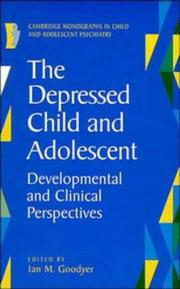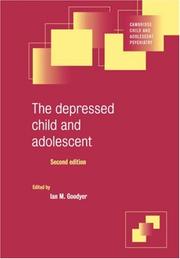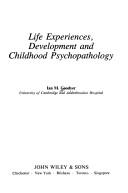| Listing 1 - 7 of 7 |
Sort by
|

ISBN: 0521433266 Year: 1995 Publisher: New York Cambridge university press
Abstract | Keywords | Export | Availability | Bookmark
 Loading...
Loading...Choose an application
- Reference Manager
- EndNote
- RefWorks (Direct export to RefWorks)

ISBN: 1107143632 9786610309535 0511543824 0511134517 1280309539 0511201990 0511137826 0511326904 0511135637 9780511137822 9780511543821 9780521660815 9780521794268 0521794269 9780511134227 0511134223 0521660815 9781107143630 6610309531 9780511134517 9781280309533 9780511201998 9780511326905 9780511135637 Year: 2001 Publisher: Cambridge Cambridge University Press
Abstract | Keywords | Export | Availability | Bookmark
 Loading...
Loading...Choose an application
- Reference Manager
- EndNote
- RefWorks (Direct export to RefWorks)
In this thoroughly revised and updated edition an international, interdisciplinary team of mental health experts draw together more recent research in the psychopathology of depression in young people. Combining theory and practice, the psychological, neurochemical and genetic causes are discussed and an account of the clinical characteristics and frequency of the condition is given. The key questions are fully addressed: the importance of life events and difficulties in the onset and continuation of depression; the efficacy of current psychological therapies and the role of medication; how depressed young people progress into adult life, and how depression arises and the effects it may exert on brain and behaviour during this crucial developmental period. This book will appeal to child psychiatrists and psychologists, developmental psychologists, neuroscientists and mental health professionals in clinical services.
Depression in children. --- Behavioral Symptoms --- Mood Disorders --- Age Groups --- Mental Disorders --- Persons --- Behavior --- Psychiatry and Psychology --- Named Groups --- Behavior and Behavior Mechanisms --- Depressive Disorder --- Adolescent --- Child --- Depression --- Medicine --- Health & Biological Sciences --- Pediatrics --- Emotional Depression --- Depressive Symptoms --- Depression, Emotional --- Depressions --- Depressions, Emotional --- Depressive Symptom --- Emotional Depressions --- Symptom, Depressive --- Symptoms, Depressive --- Children --- Minors --- Adolescents --- Adolescents, Female --- Adolescents, Male --- Teenagers --- Teens --- Adolescence --- Youth --- Adolescent, Female --- Adolescent, Male --- Female Adolescent --- Female Adolescents --- Male Adolescent --- Male Adolescents --- Teen --- Teenager --- Youths --- Depression, Endogenous --- Depression, Neurotic --- Depression, Unipolar --- Depressive Syndrome --- Melancholia --- Neurosis, Depressive --- Unipolar Depression --- Depressions, Endogenous --- Depressions, Neurotic --- Depressions, Unipolar --- Depressive Disorders --- Depressive Neuroses --- Depressive Neurosis --- Depressive Syndromes --- Disorder, Depressive --- Disorders, Depressive --- Endogenous Depression --- Endogenous Depressions --- Melancholias --- Neuroses, Depressive --- Neurotic Depression --- Neurotic Depressions --- Syndrome, Depressive --- Syndromes, Depressive --- Unipolar Depressions --- Behavior And Behavior Mechanism --- Acceptance Process --- Acceptance Processes --- Behaviors --- Process, Acceptance --- Processes, Acceptance --- Affective Disorders --- Affective Disorder --- Disorder, Affective --- Disorder, Mood --- Disorders, Affective --- Disorders, Mood --- Mood Disorder --- Behavioral Symptom --- Symptom, Behavioral --- Symptoms, Behavioral --- Person --- Behavior Disorders --- Diagnosis, Psychiatric --- Mental Disorders, Severe --- Psychiatric Diagnosis --- Mental Illness --- Psychiatric Diseases --- Psychiatric Disorders --- Psychiatric Illness --- Illness, Mental --- Mental Disorder --- Mental Disorder, Severe --- Mental Illnesses --- Psychiatric Disease --- Psychiatric Disorder --- Psychiatric Illnesses --- Severe Mental Disorder --- Severe Mental Disorders --- Mentally Ill Persons --- Age Group --- Group, Age --- Groups, Age --- Depression in adolescence. --- Adolescent psychopathology --- Depression, Mental --- Depression, Mental, in children --- Affective disorders in children --- Health Sciences --- General and Others

ISBN: 0471916021 Year: 1990 Publisher: New York Wiley & Sons
Abstract | Keywords | Export | Availability | Bookmark
 Loading...
Loading...Choose an application
- Reference Manager
- EndNote
- RefWorks (Direct export to RefWorks)
Book
ISBN: 1108983677 110899671X 1108989446 1108984541 Year: 2023 Publisher: Cambridge, United Kingdom ; New York, NY : Cambridge University Press,
Abstract | Keywords | Export | Availability | Bookmark
 Loading...
Loading...Choose an application
- Reference Manager
- EndNote
- RefWorks (Direct export to RefWorks)
The highest incidence for clinical depressions is during adolescence. Furthermore, mental health illnesses that recur over the life-course begin in young people. 70% of all mental health emerge before thirty years of age. Almost all interventions for young people have been first developed for and targeted at adults. Here for the first time is a talking therapy (BPI), that has been developed for, and with, adolescents. After thirty years of clinical experience with mentally ill adolescents and two major randomised controlled trials of treatment, the authors reveal a brief psychosocial intervention that is as effective as CBT for adolescents with depression with and without comorbid anxiety and conduct disorder. BPI can be taught to mental health practitioners in sixteen hours and they can immediately start delivery of care. After a six-month supervision, new BPI practitioners offer an evidence based and NICE approved treatment in their usual clinical practice.
Book
ISBN: 9781108989442 9781108984546 Year: 2023 Publisher: Cambridge, United Kingdom ;New York, NY Cambridge University Press
Abstract | Keywords | Export | Availability | Bookmark
 Loading...
Loading...Choose an application
- Reference Manager
- EndNote
- RefWorks (Direct export to RefWorks)
Multi
ISBN: 9781108989442 9781108984546 Year: 2023 Publisher: Cambridge Cambridge University Press
Abstract | Keywords | Export | Availability | Bookmark
 Loading...
Loading...Choose an application
- Reference Manager
- EndNote
- RefWorks (Direct export to RefWorks)
Book
ISBN: 9780198569183 Year: 2008 Publisher: Oxford ; New York : Oxford University Press,
Abstract | Keywords | Export | Availability | Bookmark
 Loading...
Loading...Choose an application
- Reference Manager
- EndNote
- RefWorks (Direct export to RefWorks)
Adolescent. --- Child. --- Cognition. --- Developmental Disabilities --- Developmental disabilities. --- Mental Disorders. --- Social Behavior. --- Social perception in children. --- Psychology.
| Listing 1 - 7 of 7 |
Sort by
|

 Search
Search Feedback
Feedback About UniCat
About UniCat  Help
Help News
News